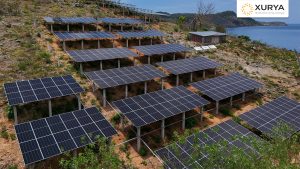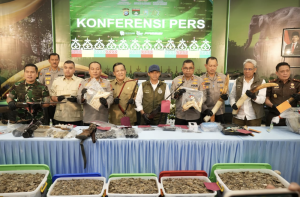Jakarta – Civil society groups believe that the Indonesia-United States trade deal is not only detrimental to the national economy but also weakens the country’s sovereignty and encourages dependence on fossil energy. The advocacy organisation ‘Transisi Bersih’, or Clean Transition, describes the trade scheme initiated since the Donald Trump era as a form of modern exploitation in the guise of a bilateral agreement.
Executive Director of Transisi Bersih, Abdurrahman Arum, said on Friday, 25 July, that Indonesia’s commitment to buy Rp244 trillion worth of gas from the United States, in return for a reduction in import tariffs to 19 per cent, made no sense in terms of geopolitics and economic sustainability.
“On the one hand, Indonesia is asked to buy large amounts of fossil energy, while on the other hand, the US opens the import faucets for critical minerals from Indonesia without tariff barriers or quotas. This is a form of policy pressure or state bullying, not fair cooperation,” said Abdurrahman.
He added that the scheme has the potential to hamper the downstream programme, which has been the backbone of the national industrial development strategy.
“We are building added value, but this agreement returns us to a position as a supplier of raw materials. This is clearly contradictory to the ideals of economic sovereignty,” he continued.
Abdurrahman also mentioned Law No. 3 of 2020 concerning Minerba, especially article 170A, which stipulates that raw mineral exports are only allowed until 2023. According to him, this policy should not be compromised in a trade agreement that allows exports without added value.
Similarly, Sartika Nur Shalati, a policy analyst from CERAH, believes that the agreement with the US actually creates a regulatory anomaly, as it opens up space for mineral ore exports that have been banned since 2020.
“If critical minerals such as nickel or bauxite are again exported in raw form, then downstream projects will be hampered, even though they are key to creating jobs in the manufacturing sector and electric vehicle technology,” Sartika said.
She also believes that Indonesia’s move to open export taps to the US would risk pressure from other countries, such as the European Union, which previously won a lawsuit against the nickel ore export ban at the WTO.
“Other countries could accuse Indonesia of giving preferential treatment to the US, and demand the same. Ultimately, Indonesia must reopen its raw ore exports to other countries. This is very dangerous,” she said.
Sartika added that environmental governance in the critical minerals industry is currently weak. According to her, many mining companies have yet to fulfil sustainability standards, such as emissions transparency and reclamation maps. “If exports are opened without strict regulations, it will worsen the ongoing environmental crisis,” he said.
Meanwhile, Tata Mustasya, Executive Director of Yayasan Kesejahteraan Berkelanjutan Indonesia (SUSTAIN), warned that the policy of importing gas from the US will be at odds with the commitment to renewable energy and energy self-sufficiency that the new government under President Prabowo Subianto has echoed.
“Large gas imports will increase electricity subsidies and compensation. This will burden our fiscals and weaken the competitiveness of domestic industries,” he said.
Tata emphasised that dependence on fossil fuels from the US would put Indonesia further into an emissions trap.
“State money should be used to accelerate the energy transition, not strengthen new dependencies. If this continues, then Indonesia’s dream of net-zero emissions is just a slogan,” he concluded. (Hartatik)
Banner image: Generated by OpenAI’s DALL·E via ChatGPT (2024)















